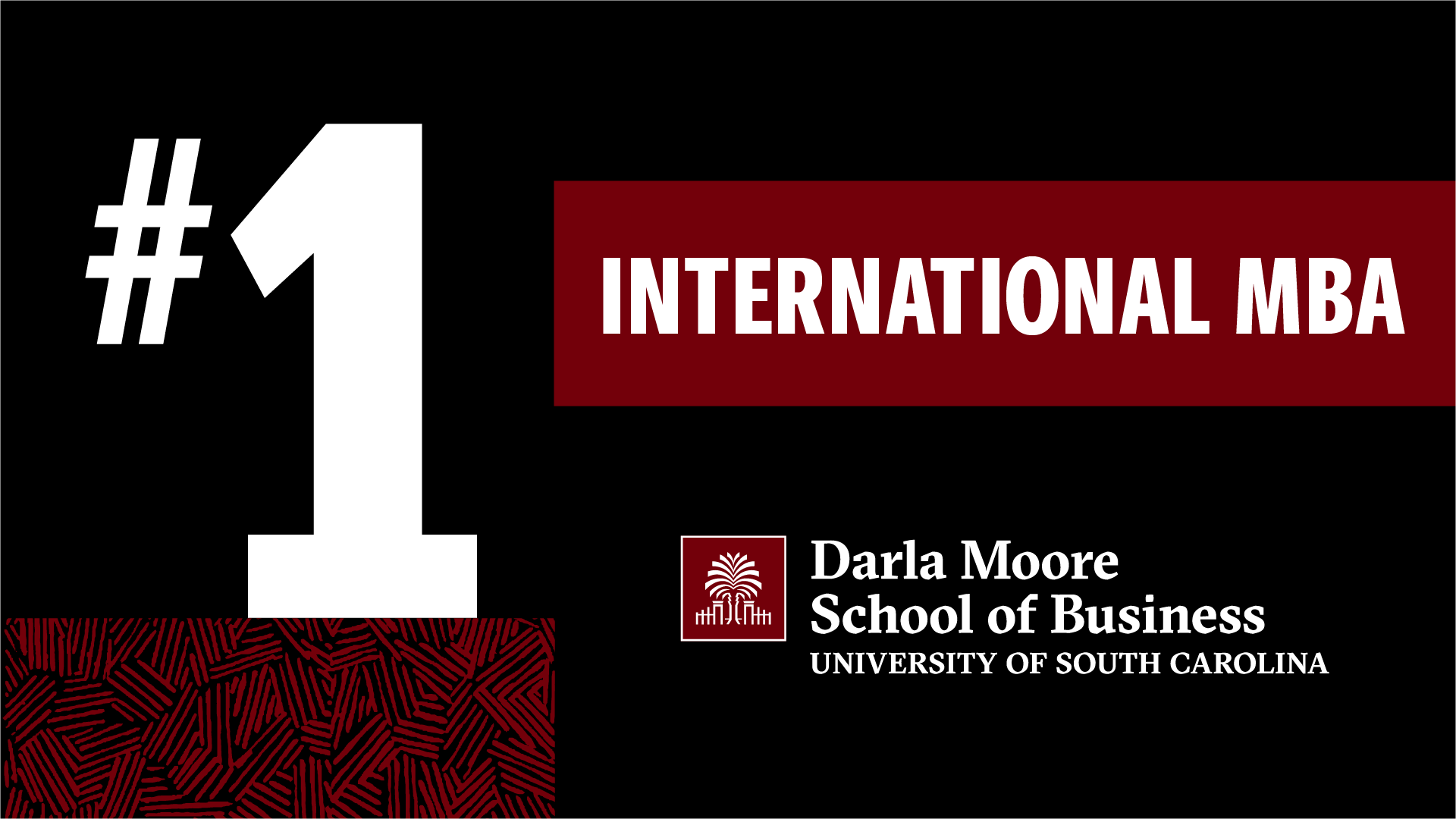Program Schedule
At the Darla Moore School of Business, you’ll enjoy an innovative approach to learning in which you’re engaged in a rigorous MBA curriculum, have access to intensive language courses and other MBA enhancements, and then challenged to apply all the concepts you’ve learned within an extensive experience abroad.
Core Classes
The International MBA program starts with a core curriculum in key functional business areas integrated with a progression of international business classes. Faculty use a variety of instructional methods, including cases, lectures, team projects and simulations.
Focuses on the management of business activities in and across international regions, incorporating techniques such as institutional and cross-cultural analysis.
Global Strategic Management: Develop a fundamental understanding of strategic and comparative management issues faced by organizations around the world. Students engage in analysis of different industry structures, country-based competitive advantages and the distinctive competencies that global organizations have as they participate in various economic systems.
Managing the Multinational Enterprise: Explore the context in which global businesses operate, including economic and political conditions in different countries, and analyze the impact of those variables on strategic management. The course also examines global leadership, cross-cultural motivation, organizational transformation, sustainability, ethics and knowledge management in multinational enterprises.
Comparative Institutional Systems: Focus on analyzing cross-national variations, state regulation and control, the organization of capital and labor, and management processes within national institution-based systems. This provides an overall framework for International MBA graduates to structure questions, observations and negotiations as they conduct business in different countries.
Courses focus on global best practices across traditional business foundational topics.
Global Supply Chain: Provides an understanding of the operations function in effectively delivering products and services. Includes operations strategy, process design, quality control, capacity planning and supply chain management.
Global Finance: Finance concepts and techniques as applied to a global setting. Considers financial markets and corporate financial decision-making.
Global Marketing: Marketing management of the international operation stressing the viewpoint of the marketing manager who must recognize differences in market arrangements and in legal, cultural and economic factors in different countries.
Quantitative Methods: Decision analysis techniques taught in the context of making business decisions. Includes basic statistics, hypothesis testing, regression analysis, decision theory, simulation, optimization and project management.
Managerial Accounting: Uses accounting information to make informed and rational decisions and choices congruent with corporate strategy.
Financial Accounting: Provides a framework for the basic role of financial accounting in business organizations and in the global economy. Focus is on understanding and using financial statements.
Students complete initial language courses on campus. This initial language study provides a solid foundation of written and oral principles in the language they selected. Students who enter the program with prior language training have the option to test out of one language class and take an additional functional core class instead.
No prior knowledge of a language is required.
Choosing a particular language is a matter of personal and professional preference.
The language track you choose does not affect the chances of admission into the program, and there are no enrollment limits on a particular language track.
International Marketplace Immersion
International MBA students participate in an in-country language or global immersion. This allows you to connect the academic coursework with the internship you have completed and see it through an international lens. The destination and construct of the immersion is driven by the track you choose.
Global Track Immersion
Select the Global Track for enhanced global curriculum with in-country immersion in a location where English is widely spoken.
Language Track Immersion
Choose the Language Track and have your choice of in-country language-intensive studies in a location where French, German or Spanish is spoken.
Corporate Internship
Your internship is directed by your track selection and program of study. Whether you choose a domestic or international internship experience, you’ll have the opportunity to apply and refine your classroom knowledge, work on an assignment relevant to the International MBA educational program, develop professional acumen, and better position yourself for a job and career following graduation.
Most International MBA internships start in May following completion of the spring semester in the first year and will end in mid-August before the start of fall term classes. While start and end dates may vary slightly, internships normally run between 10 and 15 weeks.
Electives
As your studies progress, choose from electives that allow you to develop advanced academic depth. Select a functional specialization or graduate certificate in areas including supply chain management, business analytics or finance. Review the complete elective course list [PDF].
Functional Specializations and Graduate Certificates
MBA students may choose from a selection of functional specializations or graduate certificates that align with their interests and career goals. By completing course work in a chosen area, students are able to customize their MBA to their needs and preferred area of career focus. Taking electives beyond the functional specialization or graduate certificate can further customize course work to align with personal interests and career goals.
Learn more about functional specializations and graduate certificates.
